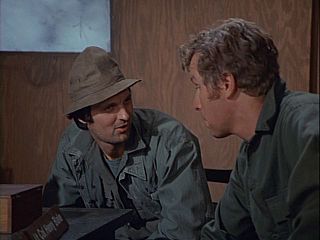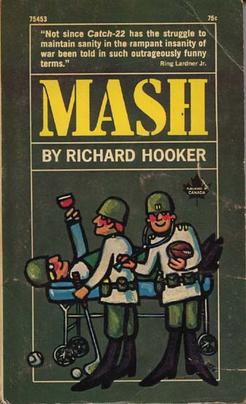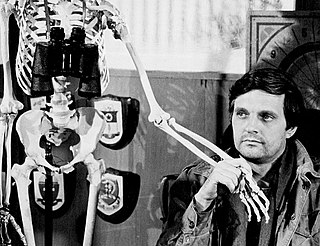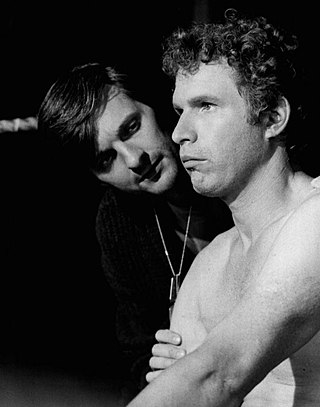| "To Market, to Market" | |
|---|---|
| M*A*S*H episode | |
| Episode no. | Season 1 Episode 2 |
| Directed by | Michael O'Herlihy |
| Written by | Burt Styler |
| Production code | J303 |
| Original air date | September 24, 1972 |
| Guest appearances | |
| Jack Soo as Charlie Lee Robert Ito as Lin Contents | |
"To Market, to Market" is the second episode of M*A*S*H . It was first aired on September 24, 1972 and repeated on April 29, 1973. Like many other M*A*S*H episodes, this one parodies army bureaucracy.
Thieves and blackmarketeers hold up a truck load of medical supplies for the 4077, thus rendering them in desperate need of hydrocortisone. In retaliation, Hawkeye and Trapper meet with a notorious black marketeer, hoping to get some replacements. When they realize they have nothing reasonable to trade with him, they go to drastic measures to get what they need. [1] [2] [3] [4] [5]
While operating on a general, Hawkeye discovers that the hospital is out of hydrocortisone. He and Trapper later learn that it has been stolen by black marketeers, along with half of the other medical supplies and an entire replacement shipment. When they go to Henry's office to complain, they find him showing off a newly acquired, 100-year-old oak desk. Henry is too nervous to call General Hammond and demand action, so Hawkeye makes the call for him; however, Hammond refuses Henry's request for a fresh shipment.
Radar puts the doctors in touch with a black marketeer, Charlie Lee, who asks $10,000 for a load of hydrocortisone he has in stock. The price is too high for Hawkeye and Trapper, so they offer to trade for Henry's desk. Charlie later visits the 4077th, dressed as a South Korean general, in order to examine the desk. He agrees to the trade, on the condition that the desk must be ready to load onto a truck early the next morning; if it is not, he will sell the hydrocortisone to another buyer.
Radar wakes Hawkeye and Trapper an hour ahead of the pickup so they can sneak into Henry's office and get the desk. Hearing the noises of their attempt to move it, Frank and Margaret separately approach the office to investigate. Upon finding one another, they rendezvous in the supply tent and lock the office door, leaving Hawkeye and Trapper with no way out. As Radar tries to persuade Charlie's truck driver to wait, the doctors take down one wall of the office and carry the desk out. Before they can get it onto the truck, though, Frank recognizes the driver from Charlie's previous visit and orders him off the base. With the truck now gone, Hawkeye tells Radar to call in a chopper pilot, who airlifts the desk out of the office and flies away to deliver it to Charlie as a stunned Henry watches from the ground.
Charlie, now dressed as a private, delivers the hydrocortisone as promised. Henry becomes suspicious, recognizing him as the visiting general, but Charlie only says, "You know how it is, Colonel. We all look alike." [1] [2] [3] [4] [5]

The pilot episode of M*A*S*H, the first episode of the first season was broadcast on September 17, 1972, although the initial script was first written in November 1971. The episode was written by Larry Gelbart and directed by Gene Reynolds, who received the Directors Guild of America Award for it. It was also nominated for two Emmys for its direction and writing.
"Bananas, Crackers and Nuts" is an episode from M*A*S*H. It was the seventh episode broadcast and aired on November 5, 1972 and repeated April 22, 1973. It was written by Burt Styler and directed by Bruce Bilson.
"Cowboy" was the eighth episode of the M*A*S*H television series. Originally shown on November 12, 1972 and repeated May 6, 1973, it was written by Bob Klane and directed by Don Weis. It is the only first-season episode listed in TV Guide as a "classic episode".
"Henry Please Come Home" was the ninth episode of the first season of the TV series M*A*S*H. It originally aired on November 19, 1972. It was written by Laurence Marks and was directed by William Wiard.
"The Ringbanger" was the 16th episode of the first season of the TV series M*A*S*H. It originally aired on January 21, 1973.
"The Longjohn Flap" is the 19th episode of the first season of the TV series M*A*S*H. It originally aired on February 18, 1973, and was the first episode of M*A*S*H to be written by series star Alan Alda.
"Major Fred C. Dobbs" is the 22nd episode of the first season of the TV series M*A*S*H. It originally aired on March 11, 1973.

MASH: A Novel About Three Army Doctors is a 1968 novel written by Richard Hooker with the assistance of writer W.C. Heinz. It is notable as the foundation of the M*A*S*H franchise, which includes a 1970 feature film and a long-running TV series (1972–1983). The novel is about a fictional U.S. Mobile Army Surgical Hospital in Korea during the Korean War.
"Abyssinia, Henry" is the 72nd episode of the M*A*S*H television series and the final episode of the series' third season. It was written by Everett Greenbaum and Jim Fritzell, and it first aired on March 18, 1975. The episode is notable for its shocking ending, in which the unit's amiable commanding officer Lieutenant Colonel Henry Blake receives an honorable discharge and leaves for home but, in the final scene, is reported killed by enemy fire. This ending prompted more than 1,000 letters to series producers Gene Reynolds and Larry Gelbart, and drew fire from both CBS and 20th Century Fox.
"Adam's Ribs" is the eleventh episode of the third season of M*A*S*H, and fifty-ninth overall. The episode premiered November 26, 1974, on CBS.

"Divided We Stand" was the 25th episode of the M*A*S*H television series, and the premiere entry for season 2.
"For the Good of the Outfit" was the 28th episode of the television series M*A*S*H, the fourth episode of season two. The episode was aired on October 6, 1973.
"The Trial of Henry Blake" is episode 8 from season 2 of the TV series M*A*S*H.
"The Incubator" was the 36th episode of the M*A*S*H television series, and the twelfth episode of season two. The episode aired on December 1, 1973.
"Deal Me Out" was the 37th episode of the M*A*S*H television series and the thirteenth of season two. The episode aired on December 8, 1973.
"Crisis" was the 45th episode of M*A*S*H, and the 21st episode of the second season. It was first transmitted on February 9, 1974.
"The Consultant" is the 17th episode in the third season of the television series M*A*S*H. It originally aired on January 17, 1975. It was written by Robert Klane, from a story by Larry Gelbart, and was directed by Gene Reynolds.
"House Arrest" is the 18th episode in the third season of M*A*S*H. It originally broadcast on February 4, 1975.

"Requiem for a Lightweight" is the third episode of the television series M*A*S*H. It was first aired on October 1, 1972 and was repeated on December 31, 1972, the first episode of M*A*S*H to do so. In Watching M*A*S*H, Watching America, a sociological examination of M*A*S*H as an illustration of shifting American values in the 1970s and early 1980s, James H. Wittebols cites this episode as an example of the sexual humor which was common in early M*A*S*H episodes, but downplayed later in the program's history.